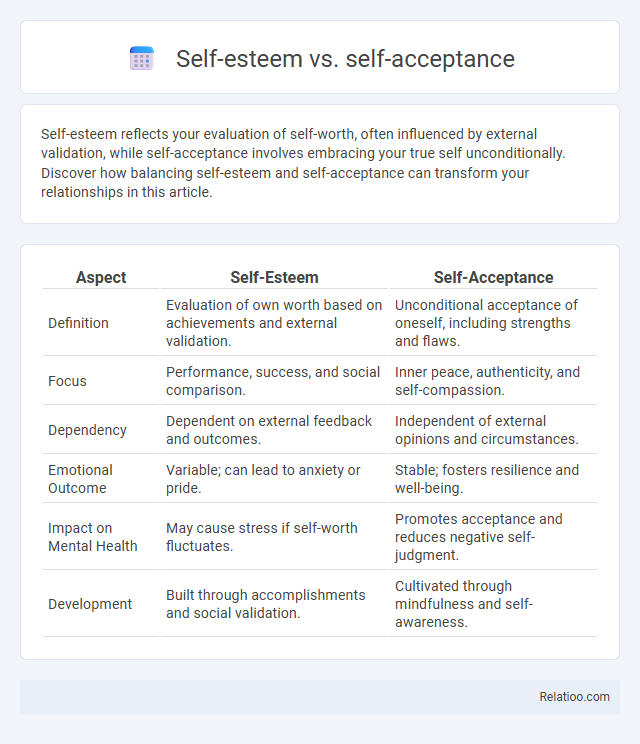Self-esteem reflects your evaluation of self-worth, often influenced by external validation, while self-acceptance involves embracing your true self unconditionally. Discover how balancing self-esteem and self-acceptance can transform your relationships in this article.
Table of Comparison
| Aspect | Self-Esteem | Self-Acceptance |
|---|---|---|
| Definition | Evaluation of own worth based on achievements and external validation. | Unconditional acceptance of oneself, including strengths and flaws. |
| Focus | Performance, success, and social comparison. | Inner peace, authenticity, and self-compassion. |
| Dependency | Dependent on external feedback and outcomes. | Independent of external opinions and circumstances. |
| Emotional Outcome | Variable; can lead to anxiety or pride. | Stable; fosters resilience and well-being. |
| Impact on Mental Health | May cause stress if self-worth fluctuates. | Promotes acceptance and reduces negative self-judgment. |
| Development | Built through accomplishments and social validation. | Cultivated through mindfulness and self-awareness. |
Understanding Self-Esteem: Definition and Importance
Self-esteem refers to the subjective evaluation of one's own worth, encompassing confidence and self-respect, which significantly influences mental health and interpersonal relationships. It differs from self-acceptance, which involves embracing one's flaws and strengths without judgment, and self-discovery, the ongoing process of exploring personal values and identity. Understanding self-esteem is crucial for developing resilience, motivation, and a positive sense of self, directly impacting personal growth and emotional well-being.
What is Self-Acceptance? Core Concepts Explained
Self-acceptance is the conscious acknowledgment and embracing of your true self, including strengths and imperfections, without self-judgment. It differs from self-esteem, which relies on external achievements, and self-discovery, which is the ongoing process of understanding your identity and values. Cultivating self-acceptance provides a foundation of inner peace and resilience essential for authentic personal growth.
Key Differences Between Self-Esteem and Self-Acceptance
Self-esteem is the value or judgment you place on yourself based on achievements, appearance, or external approval, often fluctuating with success or failure. Self-acceptance, however, is an unconditional recognition and embrace of your intrinsic worth, regardless of imperfections or external validation. Understanding this key difference helps you foster a more stable and compassionate relationship with yourself, promoting lasting emotional well-being.
How Self-Esteem Shapes Personal Identity
Self-esteem significantly shapes personal identity by influencing how individuals perceive their worth and capabilities, which directly impacts confidence and decision-making. High self-esteem fosters a positive self-concept, enabling greater resilience and authentic self-expression, while low self-esteem may lead to self-doubt and identity confusion. Unlike self-acceptance, which involves embracing oneself unconditionally, and self-discovery, which is the ongoing process of exploring personal values and beliefs, self-esteem serves as the evaluative foundation that molds the sense of self and personal narrative.
The Role of Self-Acceptance in Mental Well-Being
Self-acceptance plays a crucial role in mental well-being by fostering a compassionate and non-judgmental attitude toward oneself, which reduces stress and lowers the risk of anxiety and depression. Unlike self-esteem, which depends on external achievements and validation, self-acceptance is rooted in embracing your inherent worth, irrespective of flaws or mistakes. This deep personal acknowledgment enables greater resilience and supports your ongoing journey of self-discovery and emotional health.
Self-Esteem: External Validation vs Internal Value
Self-esteem often hinges on the balance between external validation and internal value, where relying solely on others' approval can lead to insecurity and fluctuating confidence. True self-esteem stems from recognizing your intrinsic worth, independent of external opinions or achievements. Cultivating internal validation empowers you to maintain a stable sense of self, fostering resilience and authentic self-respect.
Self-Acceptance: Embracing Flaws and Imperfections
Self-acceptance involves embracing flaws and imperfections without judgment, fostering a healthy relationship with oneself. Unlike self-esteem, which depends on external achievements or validation, self-acceptance is unconditional and grounded in recognizing intrinsic worth. This mindset encourages resilience and authentic self-discovery by allowing individuals to honor their true identities without fear of rejection.
Building Healthy Self-Esteem: Strategies and Tips
Building healthy self-esteem involves recognizing personal worth through positive self-talk, setting realistic goals, and celebrating achievements to reinforce confidence. Emphasizing self-acceptance allows individuals to embrace strengths and imperfections without judgment, fostering resilience and emotional balance. Engaging in self-discovery through mindfulness and reflection promotes deeper understanding of values and motivations, supporting sustained growth and authentic self-esteem development.
Cultivating Self-Acceptance: Practical Steps
Cultivating self-acceptance involves embracing your strengths and weaknesses without judgment, which fosters inner peace and resilience. Practical steps include practicing mindfulness, challenging negative self-talk, and setting healthy boundaries to honor your authentic needs. Your journey toward self-acceptance empowers you to build a positive relationship with yourself, enhancing overall well-being and personal growth.
Integrating Self-Esteem and Self-Acceptance for Authentic Living
Integrating self-esteem and self-acceptance fosters authentic living by balancing confidence with unconditional self-worth, enabling individuals to embrace their true selves without relying on external validation. Self-esteem reflects a judgment of personal value based on achievements and qualities, while self-acceptance involves recognizing and embracing one's inherent worth despite flaws and failures. Combining these concepts supports a deeper self-discovery process, encouraging growth and resilience through self-compassion and realistic self-evaluation.

Infographic: Self-esteem vs Self-acceptance
 relatioo.com
relatioo.com